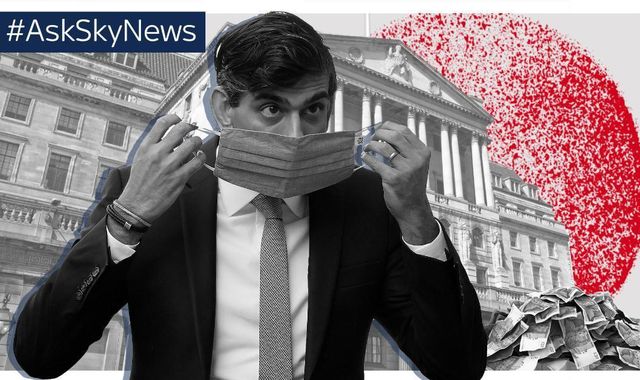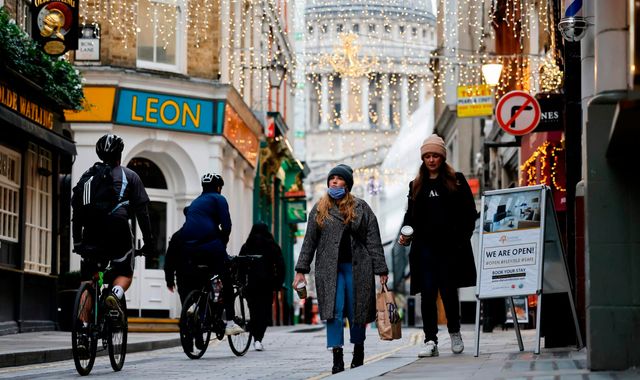Spending review: What do Rishi Sunak’s announcements mean for you and the UK?
Written by News on 26/11/2020
Sky News’ economics editor Ed Conway has been answering questions from the public about what the chancellor’s one-year spending review means for you, and the UK.

There is to be a public sector pay freeze and a cut to foreign aid spending as the UK battles soaring debt and unemployment amid a huge COVID-induced economic shrinkage.
Read our full report here.
Richard Parrett: I work in the hospitality sector, and am paid £8.72 an hour – what does the spending review mean for me?
Ed Conway: Hi Richard, given you’re being paid the precise National Living Wage at the moment, then provided you’re over 23 you can expect that to go up to £8.91 from next April.
In terms of the broader hospitality industry, the fact that the furlough scheme has been extended will also make a difference, meaning where there are strict lockdowns, companies will be able to furlough workers.
Birte, from London: Why did the government need to cut aid for the world’s poorest people to cover COVID spending, but could announce £16.5bn in extra military funding last week?
Ed Conway: Very good question Birte, to which there is no straightforward answer – other than that it will save a little bit of money. But not much.
As far as I can work out, the cut to international development aid will only save about £4bn next year, which is about a fifth the cost of Britain’s test and trace infrastructure this year.
Given how much is being spent elsewhere, it’s hard to make the case for this cut on purely economic grounds, so ultimately it comes back to politics.
Alex Mason: I’m a serving police officer with a Home Office force and I’m confused about the pay freeze for public sector workers. Is the pay freeze on general pay rises for inflation? Or is it a pay freeze on the incremental bands which police go up each year?
Ed Conway: Hi Alex, the way it’s been explained to me is that it’s a pay freeze for every public sector worker EXCEPT: those in the NHS, those earning £24k or less and those getting pay increases via pay progression awards, performance pay, overtime or promotion.
I’m not sure whether this applies to those incremental bands but I expect that will become clear as public sector pay bodies digest the news and work out how to impose it. Sorry I can’t be more specific.
Mike Morgan: With unemployment projected to rise to 2.6 million, would it not have made sense for the chancellor to reverse the planned cut to Universal Credit in the spending review?
Ed Conway: Good question Mike. To be honest I wouldn’t be altogether surprised if the chancellor ended up doing something with Universal Credit in next year’s budget, but given those payments don’t expire until next March he has a bit of time to play with. We shall see.
Another question is whether he should be making statutory sick pay more generous by providing employer support for it. He didn’t do so today, so I suppose he doesn’t have any plans to do so. But some would argue, with some justification, that low levels of sick pay are one of the reasons why many people in this country have been reluctant to take time off work even when they face COVID symptoms.
Phil from Forest Hill: With further GDP knocks forecast on a no-deal Brexit, how vital is it that Number 10 is able to negotiate a deal to meet the vision Rishi Sunak has just laid out?
Ed Conway: Hi Phil, the OBR thinks a no-deal Brexit could cut economic growth by a further 2%. This is not insignificant – indeed, in pre-COVID days that would be seen as a serious blow.
So there is a strong economic case for trying to get a deal, which is, after all, the government’s stated aim. Then again, given the UK economy will shrink this year by around 11% and grow next year by more than 5%, the reality is that even a no-deal Brexit would be dwarfed by the economic forces of COVID-19.
But the short run is not the same as the long run, and as the OBR implies and as Bank of England governor Andrew Bailey said earlier this week, the real question is what happens next.
If Britain is facing a permanently more distanced relationship with the EU that could imply more far reaching effects for the UK than COVID. If it’s a no-deal followed by a trade deal a year later… that’s a different story. As with everything else about Brexit, I’m afraid the answer is, to some extent, it depends.
Dave Williams: Bearing in mind the huge deficit in the country’s finances, are interest rates likely to increase over the next few years?
Ed Conway: Hi Dave – that’s what the historical precedent would suggest. For the most part when government borrows a lot then eventually the people buying its debt start to ask for more money to cover the risk of default.
In other words, interest rates usually go up. But we are not in normal times. Governments around the world have borrowed staggering sums in the past year but interest rates have actually gone down! In part this is because there’s a lot of different things happening at once (central banks cutting rates, questions about growth prospects).
Even so, no one should get complacent that interest rates will be low forever. And if and when they rise then the cost of financing Britain’s enormous national debt will also begin to rise, making further tax rises or spending cuts that bit more likely.
Terry Stacey: Could the rise in the national living and minimum wages be the final nail in the coffin for small and medium sized businesses already struggling to meet costs?
Ed Conway: Hi Terry, good question. For many small businesses struggling to make margins, it won’t help.
And it comes at a punishing time. Indeed, many had assumed the chancellor wasn’t going to increase the NLW this time around.
Still – they argue that it’s an important way to pull more people out of poverty and low pay.
:: Subscribe to the Daily podcast on Apple Podcasts, Google Podcasts, Spotify, Spreaker
Richard from Birmingham: What impact on the spending review would the additional £10bn cost to taxpayers on PPE due to inadequate stockpiles, as revealed in today’s National Audit Office report, have had?
Ed Conway: Hi Richard from Birmingham. As I understand it, this money has already been spent, in other words it’s already a part of the £280bn or so we’ve spent on our COVID-19 response.
The NAO’s point was that in normal times we could have procured this PPE for far lower costs. In due course there will, I am sure, be various inquiries where we find out how well or badly the response to the disease has been managed, since one could also ask similar questions about pretty much every sector of government this past year, from procurement to scientific advice to political decision-making to communication to economic analysis.
But that stuff can probably wait until the severe crisis period is over.
(c) Sky News 2020: Spending review: What do Rishi Sunak’s announcements mean for you and the UK?






